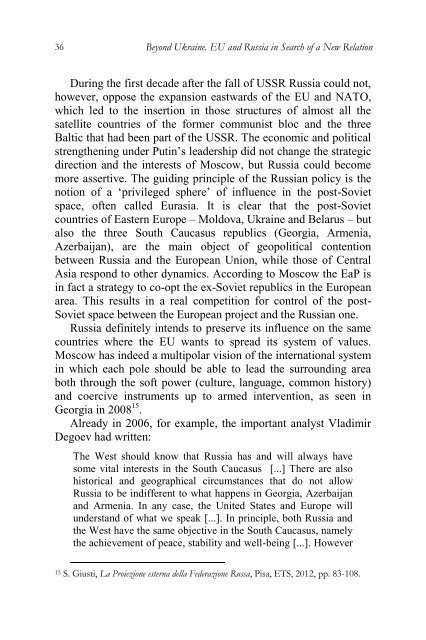beyondukraine.euandrussiainsearchofanewrelation
beyondukraine.euandrussiainsearchofanewrelation
beyondukraine.euandrussiainsearchofanewrelation
Create successful ePaper yourself
Turn your PDF publications into a flip-book with our unique Google optimized e-Paper software.
36 Beyond Ukraine. EU and Russia in Search of a New Relation<br />
During the first decade after the fall of USSR Russia could not,<br />
however, oppose the expansion eastwards of the EU and NATO,<br />
which led to the insertion in those structures of almost all the<br />
satellite countries of the former communist bloc and the three<br />
Baltic that had been part of the USSR. The economic and political<br />
strengthening under Putin’s leadership did not change the strategic<br />
direction and the interests of Moscow, but Russia could become<br />
more assertive. The guiding principle of the Russian policy is the<br />
notion of a ‘privileged sphere’ of influence in the post-Soviet<br />
space, often called Eurasia. It is clear that the post-Soviet<br />
countries of Eastern Europe – Moldova, Ukraine and Belarus – but<br />
also the three South Caucasus republics (Georgia, Armenia,<br />
Azerbaijan), are the main object of geopolitical contention<br />
between Russia and the European Union, while those of Central<br />
Asia respond to other dynamics. According to Moscow the EaP is<br />
in fact a strategy to co-opt the ex-Soviet republics in the European<br />
area. This results in a real competition for control of the post-<br />
Soviet space between the European project and the Russian one.<br />
Russia definitely intends to preserve its influence on the same<br />
countries where the EU wants to spread its system of values.<br />
Moscow has indeed a multipolar vision of the international system<br />
in which each pole should be able to lead the surrounding area<br />
both through the soft power (culture, language, common history)<br />
and coercive instruments up to armed intervention, as seen in<br />
Georgia in 2008 15 .<br />
Already in 2006, for example, the important analyst Vladimir<br />
Degoev had written:<br />
The West should know that Russia has and will always have<br />
some vital interests in the South Caucasus [...] There are also<br />
historical and geographical circumstances that do not allow<br />
Russia to be indifferent to what happens in Georgia, Azerbaijan<br />
and Armenia. In any case, the United States and Europe will<br />
understand of what we speak [...]. In principle, both Russia and<br />
the West have the same objective in the South Caucasus, namely<br />
the achievement of peace, stability and well-being [...]. However<br />
15 S. Giusti, La Proiezione esterna della Federazione Russa, Pisa, ETS, 2012, pp. 83-108.


